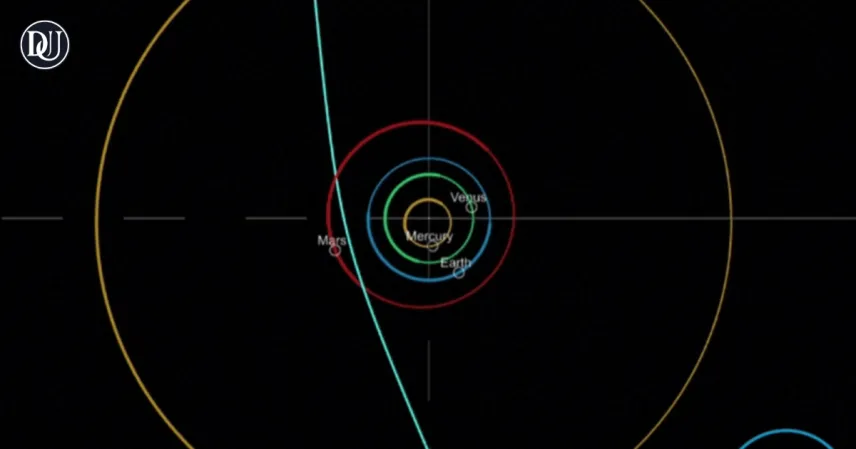Imagine something that’s been traveling for millions of years, like, literally since our solar system was just getting started. It's wild, but that’s basically what this comet, C/2023 A3 Tsuchinshan–ATLAS, seems to be – a cosmic time capsule just now making its first real pass close to the Sun. I was reading about it the other night, you know, just randomly scrolling, and it just hit me how insane that is.
💫 A Visitor from Deep Time
This thing was only spotted in early 2023 – which feels like ages ago, but in cosmic terms, that’s just a blink. Honestly, thinking about something that could be 4.5 billion years old, or something close to that, suddenly appearing in our sky, it’s a bit mind-bending. Scientists are calling it 'possibly the oldest known comet,' and that’s not just hype. It’s because its orbit is so incredibly long, suggesting it’s been hanging out way, way beyond Neptune, out in the Oort Cloud, basically undisturbed since the planets formed. Could be wrong, but that’s the general idea. It’s like finding a perfectly preserved fossil from the very first moments of life on Earth, but in space.
🔭 Spotting the Unseen: When to Look Up
The really cool part? It’s expected to put on a show for us later this year. We’re talking October 2024. Apparently, it’s going to get super close to the Sun and then whip around, getting somewhat close to Earth too. So, if you’re into stargazing, or even if you’re not, this might be one to watch. I mean, you don't often get a chance to see something that's been in cold storage for eons. It’s not guaranteed to be a naked-eye spectacle, because comets are, you know, famously unpredictable – like, one minute they’re bright, the next they fizzle. But still, the potential is there, and that’s what makes it exciting.
🧊 Icy Relics: What Makes This Comet Special?
What sets C/2023 A3 apart from your average comet? It’s about its 'pristine' nature. Most comets we see have done many trips around the Sun, gradually losing their volatile materials – you know, the ice and dust that create that beautiful tail. But this one? If it’s truly a first-timer from the outer reaches, it’s essentially untouched. It’s made of the same stuff that the early solar system was made of, before everything condensed and heated up. Researchers are basically getting a direct sample of primordial cosmic goo. It’s like a fresh-from-the-factory model of the universe's building blocks. Pretty wild when you think about it.
🌌 The Oort Cloud's Distant Domain
And where does it come from? This place called the Oort Cloud. It’s not like a visible cloud, but more like a vast, spherical shell of icy objects surrounding our solar system, way beyond the orbit of Pluto. It’s so far out that light from the Sun barely reaches it. Things just float out there, mostly undisturbed, until a gravitational nudge – maybe from a passing star, or even the Milky Way's tidal forces – sends one plummeting inwards. Honestly, the scale of it is just hard to wrap your head around. Billions of these icy chunks, just waiting for their turn to swing by. It's kinda humbling.
🤔 Will it Be a 'Great Comet'?
Everyone wants to know if this will be a "great comet" – you know, the kind that dominates the sky. The honest answer is, nobody really knows for sure. Comets are notoriously tricky. Some predictions say it could get as bright as Venus, which would be incredible. Others are more cautious. It depends on a lot of factors: how much ice it has, how much dust it sheds, if it breaks apart under solar radiation. I've noticed that whenever a comet gets hyped, there's always that chance it'll just... not. But the potential for it to be a real showstopper is definitely there. You just have to cross your fingers and look up.
🚀 More Than Just a Light Show
But here’s the thing, even if it's not super bright, this comet is still incredibly important. For astronomers, it’s like Christmas. Studying its composition, its trajectory, how it reacts to the Sun – all that tells us so much about the early conditions of our solar system. It’s basically a natural probe delivering ancient data right to our doorstep. We don't have to send a spacecraft billions of miles; the universe is delivering it to us. It really makes you think about how much we still don't know about our own cosmic backyard, you know?
🌠 Cosmic Coincidences?
It’s funny, sometimes these things feel like cosmic coincidences. A comet, unseen for billions of years, just happens to swing by now, when we have the technology to spot it and study it in detail. Is that really surprising? Maybe not always. You get the idea. But it always makes me pause and think about the sheer scale of time and space, and how we're just tiny little specks on a tiny little planet, getting these fleeting glimpses into the vastness. Anyway, probably too deep for 2 AM, but honestly, it’s pretty cool stuff.










